
The keto diet has gained popularity as a new approach to health and weight loss, focusing on fats instead of carbohydrates to help burn fat more effectively. By reaching ketosis, fat becomes the primary energy source, offering both physical and mental benefits. This article explores how the keto diet works, suitable foods, and its overall wellness benefits.
What is the Keto Diet?
A high-fat, moderate-protein, and very low-carb eating plan, the keto diet restricts carbs to induce ketosis, where the body burns fat for fuel instead of glucose. This metabolic shift can promote weight loss, boost energy levels, and enhance mental clarity.
The Components of a Keto Diet
This diet consists of:
- Healthy Fats (70-75% of daily intake): Foods like avocados, olive oil, coconut oil, and butter.
- Moderate Protein (20-25% of daily intake): Sources like meat, eggs, and cheese.
- Low-Carb Foods (5-10% of daily intake): Vegetables like spinach, zucchini, and cauliflower.
What Can You Eat on the Keto Diet?
A low-carb lifestyle offers variety:
Healthy Fats: Include avocados, olive oil, butter, and fatty cuts of meat.

Proteins: Eggs, chicken, pork, and fatty fish like salmon.

Low-Carb Vegetables: Broccoli, kale, cauliflower, and spinach.

Nuts and Seeds: Almonds, chia seeds, and flaxseeds.

Low-Carb Fruits: Berries like strawberries and raspberries in moderation.

Foods to Avoid on the Keto Diet
Avoid grains and starches like bread, pasta, rice, and potatoes, sugary treats such as desserts and candies, high-carb fruits like bananas and apples, and legumes like beans and lentils on the keto diet.
Key Benefits of the Keto Diet for Wellness
Adopting the keto diet promotes efficient fat burning for weight loss, improves heart health by boosting HDL cholesterol and reducing triglycerides, and enhances both energy and mental clarity. It also helps stabilize blood sugar levels, which is beneficial for those with diabetes or prediabetes. Additionally, this diet may reduce the risk of diseases like Alzheimer’s and certain cancers.

Potential Risks and Side Effects
Keto flu may cause fatigue, nausea, and headaches but typically passes after a few days. The diet can lead to nutrient deficiencies and digestive issues like constipation. High fat and protein levels may strain the kidneys and liver.
Who Should Consider the Keto Diet?
Consult with a healthcare provider before starting the keto diet, especially if you have kidney, liver, or metabolic issues.
Start Your Journey with the Keto Diet Today
Embracing the keto diet can help you burn fat, boost energy, and improve mental clarity. Whether you aim for weight loss or overall wellness, this approach can help you reach your goals. Start your journey today!






